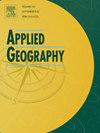技术关联、技术复杂性与中国城市数字技术发展
IF 5.4
2区 地球科学
Q1 GEOGRAPHY
引用次数: 0
摘要
数字经济已成为全球经济增长的新引擎,促使全球城市大力推动数字技术的发展。本文借鉴演化经济地理学中的关联性-复杂性框架,对中国城市的数字技术发展进行了研究。利用 1991 年至 2020 年中国 297 个地级市约 500 万件数字技术专利的数据库,我们发现中国各城市的数字技术发展迅速,但主要集中在东部城市。其次,我们的计量经济模型显示,关联性与城市数字技术的发展呈正相关,而复杂性则呈负相关。此外,通过将关联性细分为数字关联性和非数字关联性,我们发现两者在城市数字技术发展中都发挥着重要作用。此外,当关联度高,尤其是数字关联度强时,城市更有可能发展技术复杂度高的新数字技术。第三,根据每个城市的现状和内在机制,我们确定了城市发展新数字技术的未来机遇。本文章由计算机程序翻译,如有差异,请以英文原文为准。
Technological relatedness, technological complexity and the development of digital technology in Chinese cities
The digital economy has become a new growth engine for the global economy, prompting cities worldwide to vigorously drive the development of digital technologies. This article draws on the relatedness-complexity framework in evolutionary economic geography to examine the development of digital technology in Chinese cities. Using a database of approximately 5 million digital technology patents from 297 prefecture-level cities in China between 1991 and 2020, we find that digital technology has developed rapidly across Chinese cities, but is mainly concentrated in the eastern cities. Second, our econometric model shows that relatedness is positively associated with the development of digital technologies in cities, while complexity has a negative effect. Moreover, by breaking down relatedness into digital and non-digital relatedness, we find that both play a significant role in digital technology development in cities. Additionally, cities are more likely to develop new digital technologies with high technological complexity when relatedness is high, particularly when digital relatedness is strong. Third, based on the current status of each city and the underlying mechanisms, we identify future opportunities for the development of new digital technologies in cities.
求助全文
通过发布文献求助,成功后即可免费获取论文全文。
去求助
来源期刊

Applied Geography
GEOGRAPHY-
CiteScore
8.00
自引率
2.00%
发文量
134
期刊介绍:
Applied Geography is a journal devoted to the publication of research which utilizes geographic approaches (human, physical, nature-society and GIScience) to resolve human problems that have a spatial dimension. These problems may be related to the assessment, management and allocation of the world physical and/or human resources. The underlying rationale of the journal is that only through a clear understanding of the relevant societal, physical, and coupled natural-humans systems can we resolve such problems. Papers are invited on any theme involving the application of geographical theory and methodology in the resolution of human problems.
 求助内容:
求助内容: 应助结果提醒方式:
应助结果提醒方式:


